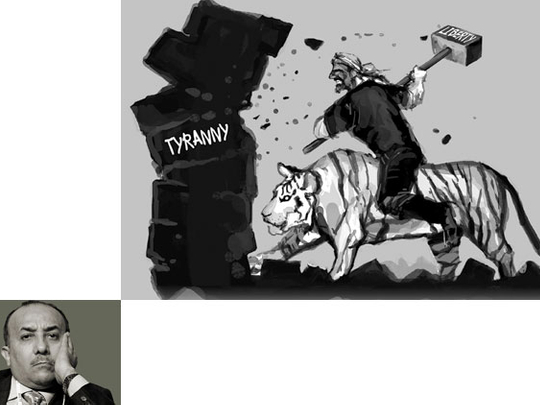
Slowly but surely the major developments in this tumultuous year in the Arab world are proving that this year is unlike all others. That is, if all goes well and these uprisings come to fruition without adverse consequences which could derail those movements and transform the Arab Spring into a winter of discontent.
This year started with a bang — a tsunami of unprecedented strength toppled and weakened the most entrenched and oppressive regimes in the region and set in motion a chain reaction of courageous movements that spread from North Africa to Yemen and from the western flanks of Morocco to Syria. It has empowered and emboldened the oppressed masses who have seen their ancestors oppressed, marginalised and brutalised by autocratic regimes through thuggery, parties and military juntas .
Three major developments underpin and shape the framework of the Arab uprisings: First, the popular uprisings sweeping across many Arab countries will have ripple effects that will take a generation to comprehend and digest.
These movements have done away with entrenched ways of governing for decades, ending practices which have become the norm such as having presidents for life, amending the constitutions to suit their interests and perpetuating their tenures, with the audacity to bequeath their posts to their sons. Rulers have kept emergency laws in place for decades to give them a free hand in oppressing their people under the pretext of keeping law and order.
These Arab uprisings do not amount to real revolutions in the classic definition of revolutions, but have hopefully eradicated the Arab psyche of submissiveness and the lack of the power of change from within without an outside power to topple their tyrannical rulers or change by radical, fringe elements in their midst, espoused by violent and terrorist organisations like by Al Qaida.
For the first time in generations Arabs have begun to believe in themselves, led by the youthful movements which seek to deliver the elusive change that bedevilled their grandfathers who were cowed into submission for too long. Thus Arabs were able to ride the tiger and surprised themselves and the rest of the world who cheered the Arab Spring. We could also rid ourselves of the West's patronising treatment.
Resilience
The second development is a result of peaceful Arab movements for reform and change. Arabs in their struggle to gain and practice their inalienable rights to be free, and be empowered by their rights and freedoms have become a force of inspiration all over the world. Chinese and North Koreans, Iranians and even Americans have been moved by the Arabs' resilience which has resonated far and wide.
The "Occupy Wall Street" movement has been spreading across America and the world, gaining in stature and impact. Its organisers have pointed to the Arab Spring as an inspirational force. Arabs for the first time since a millennium have become an influential power impacting and influencing others. The tide has finally turned and Arabs are no longer at the receiving end.
Third, the Arab Spring is being recognised as an international phenomenon. Among the women trio who won the Nobel Peace Prize this year was Tawakul Karman of Yemen, an activist who led the peaceful Yemeni movement to topple the authoritarian rule of President Ali Abdullah Saleh. It recognised Arab efforts and in particular their women's drive for freedom and justice. Thus Tawakul deservedly became the first Arab and Muslim woman to win this prestigious prize.
No doubt, the prize has strengthened the Arab Spring and embarrassed those regimes who have been defiantly resisting change and cracking down on their own people. Tawakul's winning the Nobel was a vote of confidence that resonated throughout the Arab region and beyond and a gesture of taking sides against autocratic rulers everywhere and sending a message that the international community is siding with the people who yearn for justice, rights and freedom. Thus, the message from Yemen to the rest of the Arab countries undergoing these tumultuous changes was that the whole world is with you!
The Arab world is undergoing the most comprehensive changes in decades. This is moving the region towards a new Arab order led by people power, keeping Arab leaders in check through a new system of checks and balances with powerful oversight institutions.
People's power
Arabs are capable of delivering and affecting change without foreign interventions or occupation by western powers; and the power of the people to ultimately triumph over the oppression of the rulers regardless of their brutality or their backers and allies. These historic moments we are living tell us and the whole world that Arabs are not terrorists or war mongers as the negative stereotypes have successfully and erroneously depicted us for generations.
As the Qatari Emir Shaikh Hamad Bin Khalifa Al Thani aptly put it, "How things will evolve and in which direction we are heading, will determine the fate of this region, its people and the future of our aspiration, dreams and fate." I would add to that the impact of our actions on those who are moved and awed by what we are doing. I am proud to be an Arab!
Professor Abdullah Al Shayji is the Chairman of the Political Science Department, Kuwait University. You can follow him on Twitter at www.twitter.com/docshayji









